Subscribe to Our Newsletter
Special Offer from PM Press
Now more than ever there is a vital need for radical ideas. In the four years since its founding - and on a mere shoestring - PM Press has risen to the formidable challenge of publishing and distributing knowledge and entertainment for the struggles ahead. With over 200 releases to date, they have published an impressive and stimulating array of literature, art, music, politics, and culture.
PM Press is offering readers of Left Turn a 10% discount on every purchase. In addition, they'll donate 10% of each purchase back to Left Turn to support the crucial voices of independent journalism. Simply enter the coupon code: Left Turn when shopping online or mention it when ordering by phone or email.
Click here for their online catalog.
Occupy Opportunities for Collective Liberation - Catalyst Project’s Anti-Racist Organizing Strategy
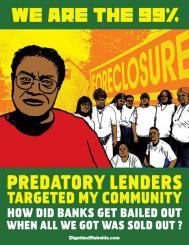 Melanie Cervantes - http://dignidadrebelde.comCatalyst Project, a center for political education and movement building, has compiled a list of resources for anti-racist/collective liberation work to build up the Occupy movement. The following is an essay from the resource list, sharing key insights from Catalyst's anti-racist organizing strategy and how it relates to the Occupy movement. The resource list will be sent out widely soon.
Melanie Cervantes - http://dignidadrebelde.comCatalyst Project, a center for political education and movement building, has compiled a list of resources for anti-racist/collective liberation work to build up the Occupy movement. The following is an essay from the resource list, sharing key insights from Catalyst's anti-racist organizing strategy and how it relates to the Occupy movement. The resource list will be sent out widely soon.
The Occupy movement is one of the most profound organizing opportunities in decades, because of its mass invitation for the 99% to step forward and challenge systemic economic inequality. For white anti-racists, this is a moment when we can engage with, support, and organize hundreds of thousands of white people to deeply connect economic justice to racial and gender justice.
For the past 12 years, Catalyst Project has been engaged in anti-racist political education, leadership development, organization building, and organizing, with a strong focus on white communities. Through our experience at Catalyst, we strongly believe that moments when people are in motion for justice create enormous openings for transformative anti-racist work in white communities. These moments will always be complicated, challenging, rife with racism/white privilege, and also full of opportunity to advance our overall goals of bringing millions of white people to a collective liberation vision, culture, strategy, and practice.
In the Occupy movement, as in all moments when significant numbers of white people are politically active, there is and will be example after example of racism and white privilege manifesting and damaging the movement. As long as there is systemic white supremacy, this is a given – not to be accepted, but to be factored into how we organize. We cannot escape history—all movements and organizations in this country have to deal with ways oppression and privilege play out externally and internally. A healthy movement isn’t one where these issues don’t exist; in our current circumstances, that’s impossible. A healthy movement develops through recognizing and challenging these dynamics in the context of shared struggle for liberation within the conditions in which we live.
As organizers, our focus isn’t to make our movements an island outside of society, but a foundation for the transformation of society. This doesn’t mean accepting the hierarchies of oppression and privilege inside our movement, but it means understanding our work against these systems in our movement as deeply connected to transforming the systems of power in society.
Anti-racist organizing
Coming from this perspective, we offer an overview of Catalyst’s anti-racist organizing strategy.
Over years of working in white communities, Catalyst uses the shorthand “white anti-racist organizing” to describe our work. What do we mean by that? When we say “white,” we mean the historical and institutional development of white supremacy, capitalism, and patriarchy in the creation of the United States, conditions which result in my now being a white person. The U.S. was created by the wealthy class to maximize private power and wealth through exploitation of the vast majority’s labor and oppression of the vast majority’s humanity. Wealth and power have been and are taken from the majority through slavery, genocide, colonization, indentured servitude, low paying/high profit making jobs, and unpaid reproductive labor in the home and community.
But wherever there is exploitation and oppression, there is resistance. Alongside the history of oppression, there is a vast history of resistance and liberation struggle. Slave masters in the South faced widespread individual and collective resistance from enslaved Africans, and at times joint struggle between enslaved Africans and Native American nations as well as with indentured Europeans. Such uprisings of slaves and servants haunted the master class, which in response outlawed marriages between Africans and Europeans and outlawed gatherings of Africans and Europeans. They passed these laws because people were forming family and building community – not in large numbers, but in significant enough numbers to strike fear into the ruling class. They understood that bonds of love, family, and community across groups of exploited and oppressed peoples – the vast majority of the population – could be a foundation for joint resistance against the minority at the top accumulating and maintaining wealth and power.
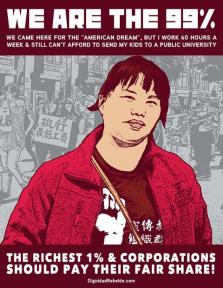 Melanie Cervantes - http://dignidadrebelde.comRuling classes, through hundreds of years of experience, developed sophisticated methods of dividing and controlling people to take land, enslave people, and create a politically docile and economically exploited class of citizens. In the United States, this method was white supremacy. In order to prevent a foundation of joint resistance from forming, a racial order needed to be constructed to divide people. While the vast majority of people were exploited to create profit, citizenship with limited (but significant) political rights became a category in society for “white” people. While these political rights were originally for land-owning European males, this expanded to include all Europeans with European women primarily having access to these rights through relationships to men.
Melanie Cervantes - http://dignidadrebelde.comRuling classes, through hundreds of years of experience, developed sophisticated methods of dividing and controlling people to take land, enslave people, and create a politically docile and economically exploited class of citizens. In the United States, this method was white supremacy. In order to prevent a foundation of joint resistance from forming, a racial order needed to be constructed to divide people. While the vast majority of people were exploited to create profit, citizenship with limited (but significant) political rights became a category in society for “white” people. While these political rights were originally for land-owning European males, this expanded to include all Europeans with European women primarily having access to these rights through relationships to men.
The expansion of these rights came primarily as a result of the ruling class responding to resistance from oppressed peoples. For example, with massive resistance from formerly enslaved Black people in the late 1800s, alongside a growing radical working-class movement with millions of newly immigrated, not-yet-white Europeans participating, the ruling class responded with a classic divide and control tactic: Americanization (white citizenship) process for Italians, Jews, Irish, Germans, Poles, Russians, and other European ethnic groups, and Jim Crow apartheid for Blacks.
White privilege
White privilege is the flipside of racial oppression. As a white person in this country, I have an economic, political, cultural, and psychological relationship of privilege to institutional power. Race is not a biological reality, but rather a position within a hierarchy of power based in one's relationship to the state. The United States was created as a white nation, for white citizens. The devastation of New Orleans because of defunded levees during Hurricane Katrina, along with the Federal governments’ failure to respond, and the current criminalization of immigrants of color from Arizona to Alabama are two high-profile examples of this enduring reality.
“White” is not a category of who I am as an individual person. Rather, white is an historically developed social position I was born into within this country. My relationship to the state and the economy shapes what I have access to, how society interacts with me, and how I understand myself in relationship to others. This is not just a relationship between myself as an individual white person and the state and economy. It is the accumulated experience of hundreds of years of white supremacist capitalist patriarchy. In short, white supremacy is internalized within me and has profound impacts on how I relate to the world around me. This internalized white supremacy is based on the material reality of political, economic, and social privilege I and other white people, experience every day as a white citizen of this nation.
It is important to make a distinction here between privilege and power. Most white people in the United States experience economic, political, and/or cultural oppression based on class, gender, sexuality, and ability, as well as race-based privilege. Privilege generally refers to rights, norms, standards, and attitudes that should apply to everyone, but that many people are denied. For example, for most of the history of the U.S., people of color were denied access to most jobs, legal protections, social services, civic participation, and neighborhoods (except to work in them). Additionally, violence against people of color has been social and in many cases de facto legally sanctioned.
Another example deeply impacting the current economic system is the ability to accumulate wealth through inheritance, or debt and poverty through inheritance. For most communities of color, there is a long history of land, labor, and lives of family members stolen through slavery, colonization, and genocide. Hundreds of years of slavery generated enormous wealth for the plantation master class in the South and the industrial capitalist class in the North, while Black communities inherited poverty, enforced illiteracy, trauma of families brutally pulled apart, and so on. In short, while many white people have and do experience profound economic hardships, the economic hardships of communities of color have been and are far more devastating, brutal, and enduring as that hardship is part of an overall white supremacist capitalism that daily denies the full humanity of people of color.
Social relationship of power
So, when we say “white,” we are primarily talking about a social relationship of power to the state and in the economy that shapes the culture of society. This relationship has been created to privilege white people, oppress people of color, and accumulate the majority of institutional wealth and power to the ruling class.
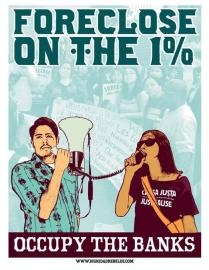 Melanie Cervantes - http://dignidadrebelde.comBy “anti-racist,” we mean engaging with white people to develop anti-racist politics, commitment, and practice as well as developing and strengthening powerful multiracial alliances and collaboration. We do this by taking action on issues impacting white communities, such as economic and environmental injustice, in ways that foreground white supremacy in the problem, anti-racist/multiracial movement building in the solution, and joining with and/or supporting similar struggles in communities of color. We also do this by joining organizing in communities of color and developing a strategy with organizers and leaders of color for bringing white people in large numbers into such struggles.
Melanie Cervantes - http://dignidadrebelde.comBy “anti-racist,” we mean engaging with white people to develop anti-racist politics, commitment, and practice as well as developing and strengthening powerful multiracial alliances and collaboration. We do this by taking action on issues impacting white communities, such as economic and environmental injustice, in ways that foreground white supremacy in the problem, anti-racist/multiracial movement building in the solution, and joining with and/or supporting similar struggles in communities of color. We also do this by joining organizing in communities of color and developing a strategy with organizers and leaders of color for bringing white people in large numbers into such struggles.
We specify here large numbers because in almost all racial justice struggles there are small numbers (from dozens to thousands) of white people involved in many ways (from leaders, organizers, educators, participants in events/demonstrations, volunteers, donors, supporters and more). While we work to develop skilled, visionary organizers and leaders to increase the effectiveness and size of this small number, we also look for ways to bring in tens and hundreds of thousands of white people to participate in meaningful ways to end white supremacy, and advance collective liberation in ways that have both immediate positive impacts and long-term transformative impacts.
Furthermore we want to build up and expand liberation culture and practice that supports white people to bring these values and commitments into how they are building community, family and raising children, and how they can bring leadership in their places of worship, schools, community activities, work places, neighborhoods, and networks. We want to develop effective anti-racist leadership to help further profound solutions based in economic, racial, gender, social, and environmental justice to the problems our communities face.
Revolutionary politics
Talking about white privilege, white supremacy, and anti-racism needs to be connected to a larger revolutionary politics of ending all systems of oppression and creating systems of liberation. This means not only challenging white supremacy in the U.S. but also challenging the role the United States has played in the world. We must understand the centrality of white supremacy in the relationship between the U.S. ruling class and the Global South, as well as in the relationship between the U.S. ruling class and communities of color in this country. This understanding helps unite anti-racist work in white communities in the U.S. to the visions, strategies, and experiences of powerful people’s movements around the world. This unity opens deeper possibilities for learning, solidarity, and collaboration.
Revolutionary politics means collective liberation, or a politics committed to the goal of liberation for all people from all forms of oppression. We see the goal of collective liberation as a long-term political commitment that guides our work, shapes our strategies, and helps us think creatively about our vision. This commitment to collective liberation takes shape as 1) recognizing the exploitation and oppression in society; 2) understanding one's relationship to that exploitation and oppression; and 3) working to form alliances between people who experience both oppression and privilege to transform this society, recognizing the centrality of oppressed people's leadership in that process.
We think of collective liberation as a vision to work towards and as a strategic orientation to help us think about the work we do. We also look at white privilege as a way to unlock the white supremacist worldview that turns white people into individuals solely responsible for pulling themselves up by their bootstraps. For myself as a white person, I see how white privilege distorts my relationship to history and my position in society. This individua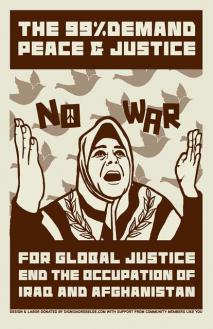 Melanie Cervantes - http://dignidadrebelde.comlism and distorted worldview are barriers to collective organizing; they negatively impact the relationship of white people to other people in general, and to oppressed peoples in the United States and around the world in particular.
Melanie Cervantes - http://dignidadrebelde.comlism and distorted worldview are barriers to collective organizing; they negatively impact the relationship of white people to other people in general, and to oppressed peoples in the United States and around the world in particular.
White privilege undermines our ability as white people to see ourselves as part of a historical process. It locks down our imagination and narrows our understanding of freedom to that of a scarce commodity that only a few can access. We challenge internalized white supremacy in mostly white sections of the left to push against the many negative impacts it has on the ability of white activists to positively relate to people of color-led collective action and collective organizing as well as multiracial collaborative organizing. The fact is, internalized white supremacy’s worldview of inherent hierarchy, domination, “us versus them”, fear-based competition for survival, ahistorical individualism, and self-blaming as opposed to systemic power analysis, negatively impacts white people’s lives and work for justice.
Power of liberation
Anti-racism is a process of seeing the power of liberation as abundant and socially necessary for the physical, emotional and psychological health of all people. White supremacy leads white people to believe that only certain people can have access to power and that those certain people constitute a ruling class made up, primarily, of white people. Anti-racism is a commitment to changing this worldview through struggles to transform the conditions in society. When we say “anti-racist,” we mean the work that makes those changes, and the process of political development white people must go through to actually believe that a liberated world is possible and that all people can – and must – have power over their lives.
By “organizing” we mean breaking the solidarity of white people to the ruling class, by breaking off any and all sections of white communities that we, as white anti-racists, can. History has demonstrated that key constituencies in white communities are more likely to break from the ruling class based on their own experiences exploitation and oppression and their struggles for equality and justice. People who are women, working class, queer, transgender and gender variant, disabled and/or Jewish have historically moved to the left, and have been anti-racist leaders in this country. We believe that powerful, dynamic movements can and will come from these constituencies, and that their leadership is key to moving significant numbers of white people to work in a multiracial movement for collective liberation.
We also believe that white anti-racist leadership and organizing in white communities for economic and social justice is necessary, and that such organizing can and must connect to issues in communities of color and create opportunities for solidarity, collaboration, and multiracial alliance building. But critically, this organizing needs to be done both to build broad white support for struggles in communities of color, but also to liberate white people from the soul crushing, body punishing, mind distorting, white supremacist capitalist patriarchy.
The goals for white anti-racist organizing are to shift any and all sectors of white communities away from an allegiance to the ruling class and towards active solidarity with liberation movements coming out of communities of color in the United States and around the world. To do this, white anti-racist organizing needs to unlock the imagination of white consciousness to conceive of liberation and believe it is possible, and the best way to do this is through firsthand experience. The Occupy movement provides incredible opportunity for exactly that--- not just the experience of one event, but of being part of movement. The job then of white anti-racist leaders and organizers is to think of the immediate goals of these actions/experiences as well as supporting people with political education, mentorship, reflection space, to make sense of their participation grounded in vision and strategy of collective liberation.
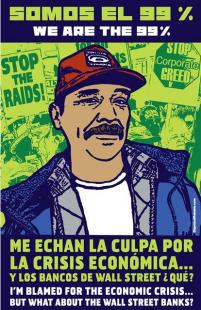 Melanie Cervantes - http://dignidadrebelde.comIn closing, for Catalyst, white anti-racist organizing is shorthand for how can we move as many white people in this country to a revolutionary agenda with a collective liberation vision, in solidarity and partnership with left leadership from communities of color. We see white supremacy as one of the primary organizing principles of this country that shapes the class structure and political system. Strategically, then, white supremacy is a key part of the foundation that we can tear out from under the ruling class to upset this oppressive system and unleash the possibility of collective liberation.
Melanie Cervantes - http://dignidadrebelde.comIn closing, for Catalyst, white anti-racist organizing is shorthand for how can we move as many white people in this country to a revolutionary agenda with a collective liberation vision, in solidarity and partnership with left leadership from communities of color. We see white supremacy as one of the primary organizing principles of this country that shapes the class structure and political system. Strategically, then, white supremacy is a key part of the foundation that we can tear out from under the ruling class to upset this oppressive system and unleash the possibility of collective liberation.
Much love to my editorial crew on this essay Chris Dixon, Cindy Breunig, Z! Haukeness, Rahula Janowski, and Molly McClure.
Lots of love to my comrades who over the years in Catalyst Project developed this strategy and analysis: Alia Trindle, Amie Fishman, Ari Clemenzi, Betty Jeanne Rueters-Ward, Clare Bayard, Ingrid Chapman, Josh Warren-White, Kerry Levenberg, Missy Longshore, Molly McCure, and Rebecca Tumposky.
Chris Crass is a father and longtime organizer working to build powerful working class-based, feminist, multiracial movements for collective liberation. Throughout the 1990s he was an organizer with Food Not Bombs, an economic justice anti-poverty group, strengthening the direct action-based anti-capitalist Left. In the 2000s, he helped found the Catalyst Project, which combines political education and organizing to develop and support anti-racist politics, leadership, and organization in white communities and builds dynamic multiracial alliances locally and nationally. He was a member of Catalyst from 2000 to Spring of 2011. He has written widely on anti-racist organizing, lessons from women of color feminism, strategy to build visionary movements, and leadership for liberation.
For more information about Catalyst Project go to http://www.collectiveliberation.org

